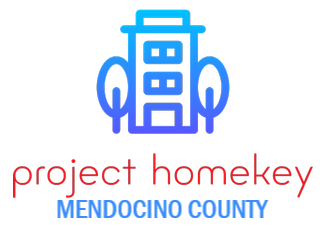FAQ
How is Project Homekey funded?
The County of Mendocino received grant funding from the State of California for the majority of the purchase price of the building. Funding for renovation was provided through CARES Act funds, One-Time Housing Funds for Whole Person Care program, Homeless Emergency Assistance Program grant funding, CDBG-CV funding, and additional small grants with a focus on housing and homelessness.
County General Fund dollars have not been spent on this project. Operational costs are funded through rent income from the units themselves, an Operating Subsidy grant provided by the State of California, and various grants for homeless-related services.
How can we be sure that this project is financially sustainable?
This project was deliberately designed to provide housing to those individuals and families who are already eligible for subsidized housing through government programs.
The financial model is secure because the vast majority of people who will be housed in this project will be able to sustain ongoing Fair Market Rent, through their own financial contributions together with the programs that partially subsidize their housing costs.
This project does not provide free housing. Everyone living in the building contributes to rent, dependent upon income.
How much do residents pay for the units?
Residents pay 30% of their monthly income toward rent upon signing a tenancy lease.
What services are offered to residents?
Residents are offered a wide variety of services and supports designed to build self-sufficiency, hope, and confidence.
During the initial months of residency, new residents develop personal goals in one or more of the following areas:
- Financial and economic stability
- Physical and emotional wellness
- Children and family
Residents are supported in accomplishing goals such as:
- Connecting with a mental health care provider
- Connecting with a primary medical care provider
- Earning a high school diploma or GED
- Enrolling in substance use treatment
- Navigating the criminal justice system
- Obtaining a driver’s license
- Obtaining a phone
- Re-connecting with family and friends
- Resolving credit score issues
- Resolving issues related to child support
- Securing ongoing housing subsidy support
- Setting up a bank account
- Seeking dental care and vision care
- Signing up for health insurance
- Seeking and securing employment
- Signing up for a post office box
and much more.
In addition to these supportive services, residents are able to take advantage of social and “extra-curricular” on-site activities such as art classes, cooking classes, crafts, holiday events, recovery groups, and other ideas we haven’t yet dreamed up.
How long are residents able to live there?
As long as a resident is able to comply with the Code of Conduct and sustain rent, that household is able to live in the units until they find suitable housing elsewhere. For some single and/or elderly residents, this might be many years. For other resident households, such as families, the length of residency might be much shorter as they find new affordable housing after they’ve gotten back on their feet and are able to achieve a higher level of self-sufficiency.
What staffing is provided on site?
The Resident Support Team includes two full time onsite support staff, and a resident building manager. In addition, a security guard is present during the evening and night-time hours.
Staffing on-site may be adjusted over time, following stakeholder and program staff feedback.
What plans are in place to ensure that this project is a safe environment and maintains safety in the neighborhood?
All residents are expected to sign and comply with a Code of Conduct. This Code of Conduct includes behavior expectations related to smoking tobacco products, guests and visitors, unit cleanliness, quiet hours, and vehicles in the parking lot. Recreational drugs are prohibited on the property and within the surrounding areas. No weapons are allowed on site. Any violations of the Code of Conduct can and will result in lease violations and/or eviction.
The Project Homekey Security Plan was developed in collaboration with local law enforcement. It provides a framework for direct communication between the police department and Project Homekey project managers following any police response to the site, as well as monthly review of calls related to the site if necessary.
Law enforcement activity at the site has been minimal. Our project managers are committed to addressing safety-related community problems immediately and directly.
How can I support this project?
This project is sustainably funded. However, our residents are living on very reduced incomes, and they always welcome the following donations:
- Diapers and baby wipes
- Feminine hygiene products
- Laundry detergent and dish soap
- Paper towels and cleaning/disinfectant wipes
- Socks
If you would like to make a donation, or support this project in any other way, please contact us. Please do NOT drop off items without prior arrangement.
How can I provide feedback on this project?
If you have feedback or would like to file a complaint, please contact our program administrator.
I know someone who would be a good resident for this project. How can I submit a residency application?
Applications for potential residents are primarily accepted through our community-based organizations and internal programs at the Department of Social Services.
If you would like to submit a self-referral for consideration, please submit our self-referral form with the names and dates of birth of the members of your household, as well as a brief description of your need. Program staff will follow up with you to schedule a brief screening interview, if and when a unit is available.
If you do not have access to email, please call 707-468-7076 and a project member will return your call.
